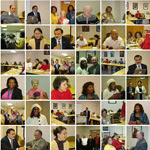Teaching and Engaging Unprepared Students: Strategies for Promoting Success and Retention in Higher EducationTuesday, May 20, 2008
First I would like to thank the CETL department for allowing me to attend my first Teaching Professor Educator Conference. The exposure was astonishing and allowed me to have a broad perspective on teaching and various techniques to utilize in all courses taught within my discipline. Each workshop was unique in its own way, diversified and tailored made to fit any courses taught at Winston-Salem State University.Yes, I attended workshops that interest me the most, including workshops on topics that would enhance my teaching techniques and strategies; most importantly, I was eager to attend those workshops that promoted growth within my department and the university.
The following workshop titled: Teaching and Engaging Unprepared Students:” Strategies for Promoting Success and Retention in Higher Education; was one of several, that enhanced my teaching techniques and inspired me to introduce innovative ways to engage student participation, decrease absenteeism and assist with student retention rates here at Winston-Salem State University.Kathleen Gabriel, a presenter from California State University, Chico discussed how colleges have diverse students, with and increase first-generation population students who may be at risk- students with learning disabilities and those who arrive unprepared for the academic rigors of college. Indeed, this is the case at most universities, however; Gabriel instructs professors in this workshop, to be prepared to reach all the students in their courses. When dealing with unprepared student, professors must use Lerner-centered educational methods as well as universal design strategies. If these areas such as methods for engaging and teaching peripheral students are addressed, research demonstrates that they have a greater chance of success according to Gabriel.Since the student population here at Winston-Salem State University is growing tremendously, the acquired knowledge of an educator should be the same. I deem it necessary to attend workshops and conferences of this sort, in order to do the following: gain knowledge on the various educational methods and strategies, engage in discussions with individuals with the same or opposing views, discover more strategies on how to use critical thinking skills, the value of small teams in the classroom, gather insights on how to promote technology usage throughout the courses in which I teach in Political Science and discover new ways in which collaborative learning can assist with student retention rates.
Noticeably, this was the conference for me, bottom line. The objectives were clear; the research presented from various professors demonstrated reliability and validity and an opportunity for you (the professor) to explore your teaching techniques, add or subtract what’s not substantial in the classroom and advance with the 21st century generation of students and academics. Again, thank you CETL, for an unforgettable life changing teaching exposure opportunity and I certainly look forward in participating in more conferences to come. As mentioned, this was a chance of a life time, one that I deem necessary in order to advance to the next level of 21st Century education with students, faculty and staff. The Teaching Professor Conference 2008, a conference of inspiration, motivation and determination for all; one in which I look forward in attending again and conferences in the near future through CETL at Winston-Salem State University.
Yolonda N. Childs MPA Department of Political Science Public Administration Winston-Salem State University
